#the doom of the noldor
Explore tagged Tumblr posts
Text
Narrative Power in Arda
An embarrassing number of months ago, I alluded to narrative as an in-universe force within the Silmarillion in my tags on a post I have since lost, which I feel merits further elaboration. The short version is that crafting a story carries meaningful weight and power in Arda, which is not much of a reach considering that 1) telling a story in a certain way has power even in the real world, and 2) music is already well-established as an important medium and means of magic in Middle Earth. I think it is relevant to consider this aspect when discussing the nature and weight of words in the Silmarillion, whether it be curses, dooms, oaths, or anything else.
To begin with, it is difficult to tease apart what I will call in-universe narrative from narrative in the sense that a guy called Tolkien wrote this whole story down, on purpose, with various story arcs that come to various narratively satisfying conclusions. The best illustrative example of in-universe narrative, thus, is Finrod’s duel in song against Sauron, because Tolkien could have had the song battle work however he wanted, but he chose to make it about storytelling. We joke about Finrod and Sauron’s rap battle, but their contest really is a battle of narratives – particularly cultural narratives. To quote:
Then sudden Felagund there swaying Sang in answer a song of staying, Resisting, battling against power, Of secrets kept, strength like a tower, And trust unbroken, freedom, escape; […] And all the magic and might be brought Of Elvenesse into his words. […] The sighing of the sea beyond, Beyond the western world on sand, On sand of pearls in Elvenland.
This is arguably the story of the Noldor, as told by Finrod – all the beauty and power of Aman, but brought by the Noldor to Middle Earth in their flight to escape the control of the Valar and avenge their king against Morgoth’s evil. This is his choice of story to wield against Sauron, and it makes sense. It invokes the Noldor’s heroism against Morgoth in maintaining the long siege, as well as their rejection of all the higher powers and his own faithfulness to his oath to Barahir that led him to this point. It’s a good story, but Sauron shatters it with a single invocation, because this narrative Finrod spins of the Flight of the Noldor cannot accommodate the atrocity that was the Kinslaying at Alqualonde.
The outcome of the song battle is not decided based on raw power, or skill in crafting magic or spells, or even singing ability. It is won on the merits of narrative: Finrod’s story doesn’t work; he cannot narratively reconcile the reality of the Kinslaying with “trust unbroken, freedom, escape,” and thus Sauron has the victory (1). Thus, we can conclude that “does the story work” is a legitimate part of how magic functions in Middle Earth.
This should not come as a surprise; Middle Earth (and the world itself) were created/predicted by the Music of the Ainur, which is itself a narrative work of music. It, arguably, puts the story in history (2). The narrative of the Ainulindale, moreover, is disrupted by Morgoth in much the same way Sauron disrupts Finrod’s narrative in their contest. But whereas Finrod’s story collapses under the contradictions introduced by Sauron, Eru incorporates Morgoth’s discord into the Music to create a new, greater theme than the one before. This is not an accident, and it shows that Eru, as God and Creator (read: Author), understands narrative better than Morgoth does: any good story has conflict of one sort or another. That’s what makes them stories, rather than a pleasant but boring account of a series of pleasant but boring events.
This is to say, Tolkien makes the necessity of having a plot arc into part of his theological worldbuilding. There is, frankly, a lot you could say about that, but I am not going to, because it is somewhat off-topic from the point I’m trying to make and also I really don’t know where to begin.
Additionally, while Finrod’s own narrative fails, the overall narrative of Middle Earth picks up where he left off and turns his defeat into a fourth-act crisis point, the abyss which makes way for Luthien’s subsequent victory over both Sauron and Morgoth and triumphant retrieval of the Silmaril. Finrod may not have known how to turn Sauron’s narrative disruption to his own ends, but Eru does.
Returning to the Doom of the Noldor, while Manwe is said to be the closest of the Valar to Eru in thought, I would argue that Namo, as the Vala of fate, is the closest of the God-as-Author aspect of Eru. His domain, fate, is closely linked with the Music. I said earlier that Middle Earth was created/predicted by the Music, and that blurriness between creation and prophecy is important for understanding the nature of Fate in Tolkien’s work - there is a careful tightrope walked between free will and determinism (3). I argue that the Music additionally suggests that fate in Arda is really Narrative at work.
So where does that leave, for instance, the Doom of the Noldor? Is it curse or prophecy? Punishment meted out by the gods or natural consequences of an unprecedented violent attack? Framing it in these binaries is reductive no matter which side you come down on. The Doom is neither a curse nor a prophecy: it is a narrative.
The soon-to-be Exiles, led by Feanor, kick off their narrative in maybe the worst way possible (murder). This is, objectively, a very bad inciting incident – stories that start with murder don’t tend to turn out well for the people doing the murdering. Within the Music, and the fabric of Arda’s fate, the Noldor have narrowed their narrative options significantly. “Slain ye may be, and slain ye shall be,” for have they not already slain their own kin? But it is very difficult to argue for the Doom as purely prophetic. The text itself indicates in multiple places the judgment or wrath of the Valar as something laid upon the house of Feanor and all who follow them, not simply natural consequences. There is a tangible weight to the Doom, and a sense after the War of Wrath that it is something that can be lifted.
Mandos says, you have chosen your story to be a tragedy by opening with a tragedy. But when this is spoken by Narrative himself, it takes on a weight greater than that of a mere prediction. The Doom defines the genre of the story that is to follow: Tears unnumbered ye shall shed. And they did.
The story, of course, is never truly over. But I’ll leave eucatastrophe for another day.
Footnotes: (1) As a side note, I am forever thinking about arrogantemu’s fic “Beyond the Western World,” in which Finrod says “I’d staked everything on an innocence I didn’t have.” Credit where credit is due for influencing my thinking on this subject.
(2) Tolkien as a linguist would undoubtedly be aware that the words come from the same root, and that other modern languages have not in fact separated the meanings of “work of fiction” and “account of real events” into separate words.
(3) To write a proper meta on this subject I would have to dig much deeper into other sources, but from my understanding fate in Tolkien’s works works very similarly to the Anglo-Saxon concept of wyrd – there’s a very interesting line in Beowulf, I believe, about how “for undaunted courage, fate spares the man it has not already marked” (paraphrased). I highly recommend reading more about it for a better understanding of fate in Middle Earth.
#the silmarilion#the doom of the noldor#meta#dear god this has been. a long time in the writing#in my defense I had to move across the country shortly after starting this#and my copy of the silm was in a box. which made research difficult. and then I forgot about it
65 notes
·
View notes
Text

And I think this was requested by @erendur 😊
The doom of the Noldor, handwritten! And with messy things because I was lazy and didn't want to rewrite everything from scratch!
And damn, Namo really said "kys and be depressed".
No sympathy.
There ain't no rest for the wicked for real.
7 notes
·
View notes
Text
sure i am doomed by the narrative, but as long as i keep wandering ever upon the shores, singing in pain and regret beside the waves, the narrative is likewise doomed to be repeated and therefore never to end. and that is its own victory, isn't it. isn't it?
37 notes
·
View notes
Link
Chapters: 1/1 Fandom: Star Wars - All Media Types, Star Wars Prequel Trilogy, Star Wars: The Clone Wars (2008) - All Media Types, The Silmarillion and other histories of Middle-Earth - J. R. R. Tolkien Rating: Mature Warnings: No Archive Warnings Apply Relationships: Obi-Wan Kenobi/Anakin Skywalker Characters: Obi-Wan Kenobi, Anakin Skywalker Additional Tags: AU set in the Silmarillion, Obi-Wan and Anakin are elves, Set during the Wars of Beleriand, Past Padmé Amidala/Anakin Skywalker, Involuntary Manslaughter, non graphic mention of someone dying by burning, Angst, The Noldor, My Tolkien knowledge is a bit dusty so forgive me please, Doom of the Noldor Series: Part 4 of Obikin Febuwhump 2023 Summary:
AU set in the Tolkien legendarium.
Nightfall Quietly it crept in and changed us all
3 notes
·
View notes
Text
Just on the last thing, I understand Finarfin's host arrived after the First Kinslaying had taken place. So wouldn't that make her a non participant? "Clean hands" perhaps not in that she later chose to follow Fëanor anyway after the Doom, but I also mention because even after learning of the Kinslaying, the House of Finarfin was never banned from Doriath.
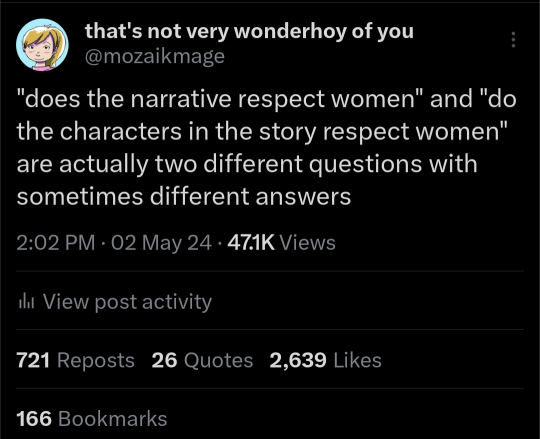
81K notes
·
View notes
Text
I've always wondered what the latter generation Finweans thought of the Doom of the Noldor. Most of them lived through the horrors of the First Age, suffered alongside their parents, uncles, etc even though none of them were involved with the kinslaying– hell, most of them probably weren't even alive. How do you come to terms with the fact that you are paying for the crimes of your relatives? That you were, before you were even born, doomed to suffering and death?
Did Celebrimbor think his father deserved to be slain for what he'd done during the kinslayings? Did he think he deserved it for being a kinslayer's son?
What did Galadriel think when she was cast out, even though she'd fought in defense of the Teleri? Did she ever resent the Valar for refusing to let her back for so long? Did she feel like her actions were justified, right until the end?
How about Idril? Did she think her mother's death was fair pennance for the Noldor's disobidience and the actions of her uncle Fingon? Did she ever wonder why it had to be Elenwe who suffered, when neither her nor Turgon had any part in the murder?
Earendil? He was no kinslayer, and neither was his mother or his grandfather, but the Doom came for him and Gondolin anyways. Did he resent the Valar for that? Did he resent them for leaving Middle-Earth to suffer?
Elrond? No doubt he saw, far more viscerally, exactly what unnumbered tears looked like when he stayed with the Feanorians. Did he think it was a fair punishment? Did he think his own pain was acceptable collateral damage? Did he think all of Middle-Earth was acceptable collapteral damage?
When Gil-Galad turned Annatar away from Lindon, did he do it because he suspected Annatar wasn't a true emmisary of the Valar? Or did he just not want to speak to a representative of those who had damned his people for something many of them never did?
#silmarillion#silm headcanons#house of finwe#celebrimbor#gil galad#galadriel#elrond#idril#earendil#annatar#things I wonder about#the Doom of the Noldor may have been a response to the kinslaying but it affected soooo many more people
261 notes
·
View notes
Text
Silm time travel fixit fic where Curufin is spat out into his younger self fairly early in YoT, and when his efforts to solve the Noldor's political/ Melkor problems bear no fruit... he just fucks off to Alqualonde to apprentice as a ship-builder, because it's a concrete and fixable future problem.
#tolkien#san shoots the breeze#He does his damnedest to single-handedly build a fleet for the noldor#To feanor's proud bemusement (feanor sees no need to rush! But curufin's faith in his plans to leave is touching)#If he's spat out late he goes to learn shipbuilding early. Less time to influence events but plenty of time to circumvent Doom#He takes it up with a strong spirit of malicious compliance. He's sure the valar *want* to damn them and he'll make sure they have no excus
504 notes
·
View notes
Text
It's kinda funny how Silmarillion fans characterize Maeglin as this poor misunderstood goth kid who was ostracized by Gondolin, when Tolkien goes out of his way to describe how Maeglin was beloved of both his family and the people of Gondolin and that he rose high in honor and acclaim, but Idril was the only one who mistrusted him and that was because he was in creepy obsessive incesty love with her.
Like, it's a pretty straightforward case of "this guy has so much good stuff and has so much going for him but was corrupted by greed for the one thing he couldn't have". It's the same thing that ruined Feanor and his sons and so many others.
I'm not saying that what was done to him by Morgoth wasn't a tragedy, but he was also the architect of his own destruction.
#Silmarillion#Tolkien#LotR#Lord of the Rings#Lore#LotR lore#Silmarillion lore#Maeglin#Lomion#Idril#Idril Celebrindal#JRR Tolkien#Curse of Mandos#Doom of the Noldor#Feanor#Sons of Feanor#Morgoth
394 notes
·
View notes
Text

as requested, @kanalaure the meme has been added!
this fandom has been circling and circling around the kinslayings and the ownership of the silmarils for actual decades and i think that everything that could possibly be said about them all has already been said at least twice
but in a more recent frame of reference, what i haven't really seen in amongst all the meta, and the "so-and-so should have"'s and the "so-and-so should not have"'s, is an acknowledgement that it was not possible after alqualonde¹ for there to be any peaceful resolutions or negotiations. the noldor and sindar alike were affected and constrained by the doom, particularly where the silmaril was concerned, because the noldor had been quite literally damned by the vala of fate² and-- as the title kinslaying suggests-- the sindar fell under the "treason of kin unto kin, and fear of treason" portion of the doom
a very many arguments about the relative selfishness/foolishness/property-and-inheritance-rights of the feanorians, dior, elwing, and anyone else within a position to have had an impact on that conflict, are redundant because the very moment the silmaril was invoked as the bride-price³, it was never going to be able to be peacefully resolved. it could not have been. whatever could have happened in a world where they were their own agents, that is not this world
¹ which, i would like to point out once more, was not a planned battle unlike the other two. it was a riot caused by desperation and fear, and it was terrible, but it was not premeditated
² this is not actually up for debate. the valar rolled back the doom at the conclusion of the first age, which means it was a curse, not a prophecy. the relative degree of culpability assignable to the valar for all the tragedies of the first age, and the ones that followed as a result, are up for debate, and frankly i'd rather talk about that than discuss whether or not dior or elwing should have surrendered the silmaril for the thirty-seventh time this year
³ it doesn't actually matter if thingol said that in jest or in seriousness, because they very much did bring one back, and frankly it was a boneheaded move on thingol's part to name that as his impossible task to earn her hand. there are easier ways to tell one's daughter's boyfriend to fuck off than to call on a cursed, blessed, bound object currently located in literal-hell-on-earth. he should've asked for glaurung's head on a pike smh
230 notes
·
View notes
Text







Silmarillion as stuff I have on my phone
#fingolfin#maedhros#maglor#celegorm#caranthir#curufin#feanor#sons of feanor#melkor#morgoth#doom of the noldor#fingon#russingon#beren erchamion#finrod felagund#luthien#beren and luthien#earendil#elwing#tolkien#silmarillion#silm crack#text post#some of these aren't based on canon im just going off vibes and getting rid of as much shit as possible on my phone#mp
352 notes
·
View notes
Text
So, the Doom of the Noldor
Isn't very strict, to put it politely.
Tears unnumbered ye shall shed; and the Valar will fence Valinor against you, and shut you out, so that not even the echo of your lamentation shall pass over the mountains.
...except that one time when Manwe sends an eagle to Fingon to save Maedhros (both kinslayers) precisely because of Fingon's lamentations prayer...
On the House of Fëanor the wrath of the Valar lieth from the West unto the uttermost East, and upon all that will follow them it shall be laid also. Their Oath shall drive them, and yet betray them, and ever snatch away the very treasures that they have sworn to pursue.
...except that one time M&M actually get the Silmarils. Yes, it's kind of ambiguous with this wording, because they do lose them eventually. But still, this 'prophecy' seems a little misleading here.
To evil end shall all things turn that they begin well; and by treason of kin unto kin, and the fear of treason, shall this come to pass.
...except Galadriel's woodland realm, which, sure, fades but doesn't end up evil. Also, Celebrimbor technically wasn't betrayed by his kin, and definitely in was not fear of treason what killed him...
The rest is ok, but even three mistakes— Even one mistake would prove that it wasn't Namo speaking those words. Namo makes no mistakes, doesn't lie, doesn't joke and doesn't use hyperboles. (Yes, that's headcanon.)
Namo is too omniscient to not be literal.
Many of you will say I'm being picky, and the eagle doesn't count or the words meant something else, and Galadriel wasn't with the Noldor but went separately (per later writings) or something.
Anyway, I'm pretty strict-minded when it comes to prophecies and I really don't think Namo would be that imprecise. Must have been one of his Maiar or whatever.
#Namo said this Namo said that#allegedly#he allegedly said that#he speaks in short sentences not prophecies#Namo#mandos#tolkien#silmarillion#tolkien legendarium#silm#feanor#Noldor#doom of the Noldor#don't even get me started on other things he allegedly said
82 notes
·
View notes
Text
Gotta love how all encompassing the Doom of the Noldor is. Doom on you, Doom on your children, Doom in your dog.
#huan#the silmarillion#slowly ceding my soul to the silmarillion#he's one of the many doomed heros#doom of the noldor
64 notes
·
View notes
Text
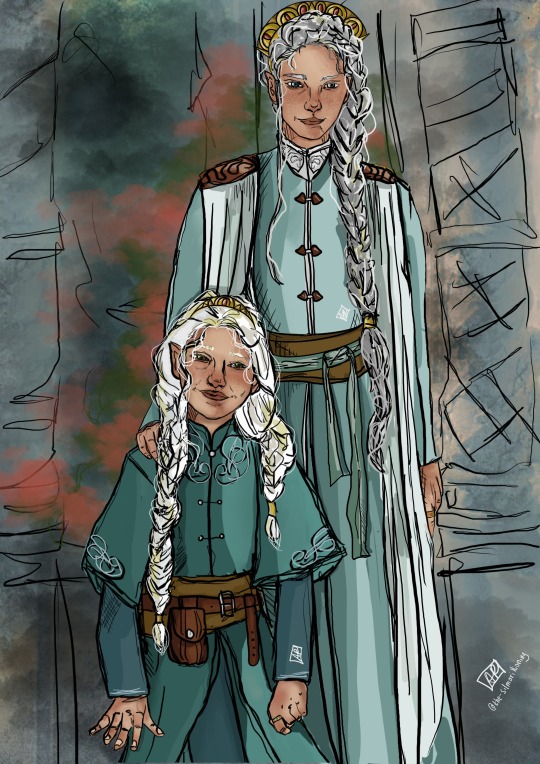
Oropher and Thranduil in Doriath.
Prince Oropher is a workaholic sometimes-over-protective-dad who manages the financial aspects of the kingdom of Doriath, as well as making sure the agencies that regulate the development of the infrastructure, military, rations and economics, etc. are working correctly. He's the Secretary of State, basically. All these qualities served him well when Menegroth was no more and he had to raise a whole new Kingdom in Greenwood. Rivendell and Lorien are elf settlements but small compared to the Oropherion halls which are basically a Menegroth 2.0. where most sindar survivors and green elves live.
As an adult and a King, Thranduil eventually realizes that the workaholic sometimes-over-protective-dad part is genetical. He thinks Oropher would find that hilarious. Somewhere in the Halls Of Mandos Oropher definitively does.
My stories and head canons: AO3
#tolkien#my art#While the whole deal with the silmarils war with the dark lords of angband impending doom involving the Noldor and the naugrim is happening#Oropher has his fourth cup of extra strong black tea and lavender while sitting on his desk trying to fix everything while he keeps telling#himself in an almost manic voice 'this is fine. this is fine. everything is perfectly fine' *literal fire around him*#the silmarillion#Oropher of Doriath#Oropher#thranduil son of oropher#lotr
124 notes
·
View notes
Text
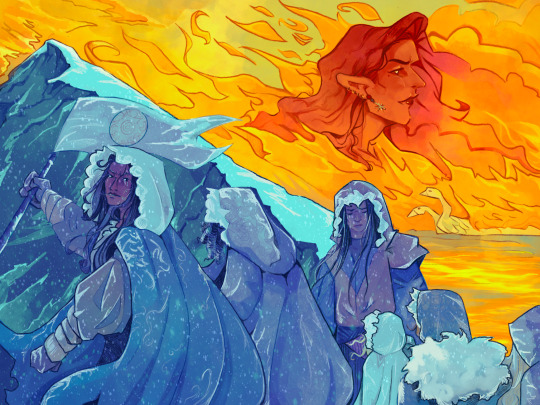
“Condemned and betrayed
Now everything's said
See my eyes (are) full of tears
And a cruel price we've paid
But still I can't claim
That I'm innocent”
-Noldor-Song by Blind Guardian
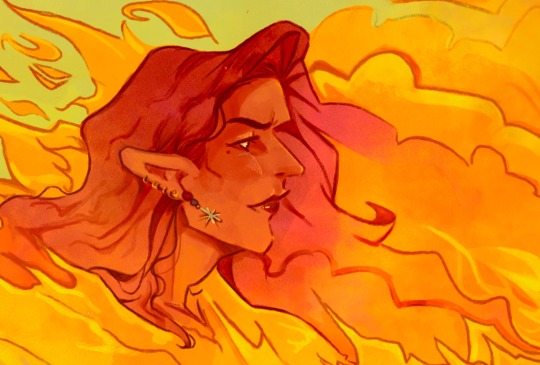
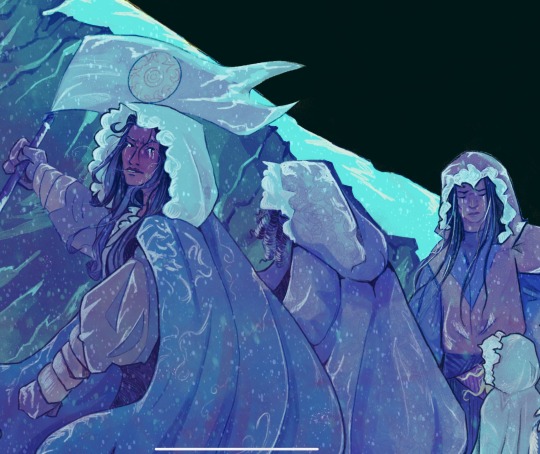
#feanor#fingolfin#turgon#fingon#idril celebrindal#tolkien#silmarillion#lotr#lord of the rings#j r r tolkien#nolofinwe#curufinwë#fëanor#doom of mandos#blind guardian#noldor#silmart#fantasy#elves#house of finwe#house of fingolfin#nolofinweans#arafinweans#alqualonde
945 notes
·
View notes
Text

#doom of mandos#mandos#noldor#tolkien#middle earth#the silmarillion#silmarillion#silmarillion memes#jrr tolkien#tolkien elves#feanor
510 notes
·
View notes
Text
My Nolofinwë brainrot is back in full force!!!!
Imagine growing up in a household where you KNOW your father loves you but not more than your elder brother who can do now wrong in his eyes even when he ignores your existence and probably hates your mother. Imagine growing up as a PRINCE of the Noldor but always coming in second in the eyes of the people because you’re NOT your brother. You don’t shine as bright as him, you’re not as crafty as him. The work of your hands do not inspire such devotion that even the gods above seek to bless it with their protection.
Imagine knowing that the sole reason for your existence is because your fathers beloved first wife was condemned to an entirety in the Halls of Mandos and thus causing your brilliant elder brother to despise your mother and ignore your existence so wholly it starts fracturing the Noldor. Imagine trying your best to be friends with your brother but him pushing you away at every turn so eventually you decide that if you can’t have his love you’d have his hatred because even hatred is better than the indifference he showed you growing up.
Imagine loving and hating your brother in equal measure, imagine hating him so much for condemning your host to the ice because of your choice to name yourself with an extra Finwë in your name yet mourning him so deeply when you cross the ice just to discover he is already dead and all your hate cannot be aimed at the person responsible because what good is holding on to that hate when he is already dead? What good is that hate when you KNOW you can never have any sort of resolution with him until the breaking of the world? What good is holding on to that hatred when your nephews are holding on by a string and civil war may very well break out due to your beloved and loathed half brother?
Do you think Nolofinwë thought of his much loved and much loathed brother Feanor when he rode out to Angbang to challenge the Dark Lord himself?
Do you think that he thought of how he might meet his end the same way Feanor did? Riding out before the host and getting ambushed by Balrogs? Do you think he thought that this is the one way he can one up his brother? By succeeding when Feanor failed? By wounding the Dark Vala so badly he refused to leave his black walls? Do you think at the end of his life when he saw Morgoths foot coming down on him, when he raised his sword for one last strike, do you think he thought that maybe, just maybe, his deeds of valour may finally make his brother proud? That maybe he lived up to his bright, fiery, spirited brother at last? That although he may not have made the greatest works known to man, but he succeeded where bright Feanor failed?
Do you think that he searched the halls for Feanor? Even knowing he may have been condemned to the void? Or do you think he, in his last moments, cursed Feanor more than he did when crossing the ice because if it weren’t for his oath to him, his children and nephews may still very much be alive?
I cannot begin to describe just how much Nolofinwë lives in my mind rent free. The angst growing up, the resentment that built up in him every single time he gets compared to Feanor, the desperation to get to know him anyways because that’s his brother! His older brother! The one that was supposed to love him but didn’t because of his mother. Gods Nolofinwë makes me feral in a way that not even the Sons of Feanor can.
#the silmarillion#nolofinwe#fingolfin#Feanor#feanor and feanors kin#gods am I feral for this eldest daughter coded character#the middlest of middle children the one who is so desperate to live up to the the shadows cast by his brilliant elder brother#the one who swore an oath to follow Feanor but Feanor went to a place he cannot follow him to#and having to pick up the pieces of the Noldor because of his brothers and his oaths#the conflict he must feel within himself because he loves his brother!!! how can he not????#he loves Feanor yet he loathes his just as much!!!#his brilliant older brother that led him to his doom
33 notes
·
View notes